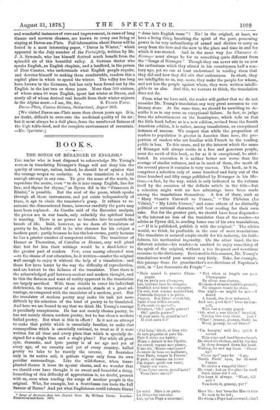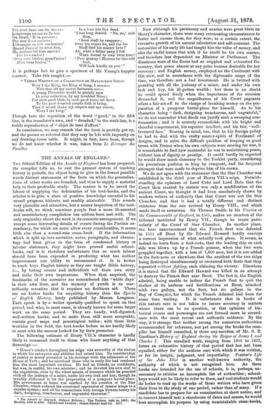BOOKS.
THE SONGS OF BERANGER IN ENGLISH.* THE reader who is least disposed to acknowledge Mr. Young's sucecas in translating Beranger's Songs will not deny him the quality of courage, unless, indeed, he should be of opinion that the courage verges on audacity. A verse translation is a bold enough attempt in any case. To give the sense of the words, to reproduce the metre, even "to do it into cramp English, line for line, and rhyme for rhyme," as Byron did in the "Francesca di Rimini," is possible. But the soul of the poem, which speaks through all these instruments, and yet exists independently of them, is apt to elude the translator's grasp. It refuses to re- animate the dismembered frame, however carefully the parts may have been replaced. As Goethe said of the Baconian analysis, the pieces are in our hands, only unluckily the spiritual bond is wanting. There is no power to breathe into its nostrils the breath of life. Bold, however, as we deem all translators of poetry to be, bolder still is he who chooses for his subject a modern poet ; partly because he has the less excuse, partly because he has a greater number of competent critics. The translator of Homer or Theoeritus, of Catullus or Horace, may well plead that but for him their writings would be a dead-letter to the greater part of readers. Few, even among educated men —to the shame of our education, be it written—master the original well enough to enjoy it without the help of a translation ; and those few have learnt by the way the difficulty of reproduction, and are lenient to the failures of the translator. Then there is the acknowledged gulf between ancient and modern thought, and to this the flatness and want of reality apparent in the translation are largely ascribed. With these shields to cover his individual deficiencies, the translator of an ancient, stands at a great ad- vantage, as compared with the translator of a modern, poet. But the translator of modern poetry may make his task yet more difficult by his selection of the kind of poetry to be translated. And here we are bound to say that we think Mr. Young's courage is peculiarly conspicuous. He has not merely chosen poetry, he has not merely chosen modern poetry, but he has chosen modern ballad poetry. But what is this in effect ? Is it not an attempt to make that public which is essentially familiar, to make that cosmopolitan which is essentially national, to treat as if it were written for all time and every place that which is specially de- signed for a single time and a single place? For while all great epic, dramatic, and lyric poetry is of no age and yet of every age, of no country and yet of every country, ballad poetry we take to be exactly the reverse. It flourishes only in its native soil, it gathers vigour only from its own
peculiar surroundings. Like the wild-flower, when trans- planted thence it loses its special charm, and we wonder that we should ever have thought it so sweet and beautiful a thing. Something of this difficulty of appreciation is, no doubt, present with us, even when reading the songs of another people in the original. Who, for example, but a Scotehman can taste the full flavour of Burns? And yet what Englishman could tolerate Burns * &nos of Biranger, done into English Verse. By William Young. London: Blackwood and Sons. 1875.
"done into English verse "? No! in the original, at least, we have a living thing, breathing the spirit of the poet, possessing power in its very unfamiliarity of sound and diction to carry us away from the here and the now to the place and time in and for which it was created. And in the same way Les Chansons de Berangcr must always be for us something quite different from the "Songs of Beranger." Though they can never stir in us now the enthusiasm which they stirred in his countrymen half a cen- tury ago, yet we can at least understand in reading them that they did and how they did stir that enthusiasm. In short, they are intelligible to us, nay, more, they make the people for whom, and not less the people against whom, they were written intelli- gible to us also. And this, we venture to think, the translation does not do.
From what we have said, the reader will gather that we do not consider Mr. Young's translation any very great accession to our literary store. At the same time, we should be unwilling to de- scribe it as in any sense an exceptional failure. In fact, to judge from the advertisement on the frontispiece, which tells us that the little book before us is a new edition, revised from the fourth American edition, it is rather, among translations, an exceptional instance of success. We suspect that while the proportion of readers to population is greater in America than here, the pro- portion of readers who are familiar with French to the reading public is less. To this cause, and to the interest which the name of B6ranger will always excite in a free and generous people, must the merit of this book, so far as it is exceptional, be attri- buted. In execution it is neither better nor worse than the average of similar volumes, and as in most of them, the merit of the several pieces it contains is very uneven. The book, as it is, comprises a selection only of some hundred and forty out of the three hundred and fifty songs published by Wranger in his life- time,—a fact, by the way, which is only indicated in the volume itself by the omission of the definite article in the title—but a selection might with no less advantage have been made among the translations themselves. A few of these, such as "Mary Stuart's Farewell to France," "The Plebeian (Le Vilain)," "My Little Corner," and some others of no distinctly political or national character, will bear reading for their own sake. But for the greater part, we should have been disposed— in the interest no less of the translator than of the reader—to advise as Byron did, in sending home one of his own translations, —" if it is published, publish it with the original." The advice would, we think, be profitable in the case of most translations. The translator is secured ample credit for his industry, his faith- fulness, his mechanical ingenuity. On the other hand, the in- different scholar—his reader—is enabled to enjoy something of the spirit of the original, without a too frequent and vexatious recourse to the dictionary. Reviewed in this manner, Mr. Young's translations would pass muster very fairly. Take, for example, this passage from the grandmother's recollections of Napoleon's visit, in "Les Souvenirs du Peuple "
"But when at length our poor
Champagne By aliens was o'orrun, Ho seemed alone to hold his ground ; No dangers would ho shun.
One night—as might ho now—I heard
A knock, the door unbarred, And saw, good Clod! 'twas ho With but a scanty guard.
Oh, what a war this is I' he cried,
Taking this very chair. [sat ? What ! granny, granny, there he What, granny, he sat there?' 'I'm hungry,' said he ; quick I
served Thin wine and hard brown bread; He dried his clothes, and by the fins In sleep drooped down his head. Waking, he saw my tears. 'Cheer up !
Cheer up!' says he. • I go, 'Neath Paris' oyes, for ill-used France
To strike A vengeful blow.'
Ho went ; but on the glass ho used Such value did I set, I've kept it always. What, till now ?
You•have it, granny, yet !'
Le void. Male it sa parts
Le H6ros fut entrain6. Hero 'tis : but 'twas the Hess's fato
To ruin to be led ; He whom a Pope had crowned, alas I Lui, qu'un Pape a couronn(:,
"Male quand la pancro Cham- pagne
Fat en prole aux (grangers, Lui, bravant tons les dangers, Somblait soul tenir In campagno. Un soir, tout comm.) aujourd'hui, J'entends trapper it la porto. J'ouvre. Bon Dieu! c'fitait lui, Suivi d'une foible escorts. II s'asseoit oft me
Feeriant, 'Oh! quell° guerre! Oh! quell° guerro s'est assis la, graturnii:re ! II s'est assis lit ?'
'J'ai faim,' dit-il; et bien vito Jo sere piquette et pain his. Pais ii seche ses habits : Memo it dormir le fen l'invito. An revel], voyant mos pleura, II me dit, 'Bonne espirance ! Jo sours de tons sos malheurs, Sous Paris, vonger la France.' II part ; et comma an triSsor J'ai depuis garth; son verre,
Gardii son verre.
'Vona ravez encor, grand'mere ! Vous l'avez encor?'
Est rnort dans une lie &sort-. Longtemps aucun ne l's era. On disait, '11 vs paraitre ; Par mer ii eat accouru ; L'dtranger vs voir son maitre.' Quand d'erreur on nous tira, Ma douleur fut bien ambre !
Fut bien ambre
Dieu VOUS bdnira, grand'mere ! Dien Tons kdnii a."
In a lone isle lies dead.
'Twas long denied. 'No, no,' said they, Soon shall he reappear ; Over sea conies he, and the foe Shall find his master hero!' Ab, what a bitter pang I felt When forced to own 'twas true ! Poor granny ! Heaven for this will look, Will look kindly on you.'"
It is perhaps fair to give a specimen of Mr. Young's happier manner. Take this couplet :— " VERSES WRITTEN ON A COLLECTION OF MANUSCRIPT SONGS.
Were I the King, the King of Song, I mean—
Title that oft my secret flatterers use— A young Pretender would be plainly seen In your collection, by my troubled Muse ; For such good hints in such good verse set down To the poor dreaded people doth it bring, That it would shake my sceptre and my crown, Were I the king."
Though here the repetition of the word "good," in the fifth line, is the translator's own, and "dreaded," in the sixth line, is a feeble reproduction of "objet de tant d'effroi."
In conclusion, we may remark that the book is prettily got up, and the poems so selected that they may be left with impunity on any drawing-room table. It might, in fact, have been, though we do not know whether it was, taken from Le Beranger des Families.































 Previous page
Previous page